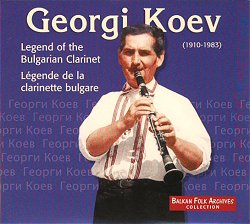Georgi Koev (1910-1983)
Legend of the Bulgarian clarinet
Balkan Folk Archives collection BMA-1009
1 Konarska Trapeza; 2 Krivo Horo; 3 Rachenitsa; 4 Na Trapeza i Horo; 5 Krivo Horo; 6 Rachenitsa; 7 Gaida; 8 Pravo Pazardzhishko Horo; 9 Krivo Pazardzhishko Horo; 10 Zhetvarska Pesen i Rachenitsa; 11 Na Trapeza i Rachenitsa; 12 Malokonarsko Horo; 13 Golyamokonarska Rachenitsa; 14 Krivo Horo; 15 Na Trapeza i Rachenitsa; 16 Stroevsko Horo; 17 Pazardzhishka Rachenitsa; 18 Krivo Chernogorovsko Horo; 19 Malokonarsko Horo; 20 Krivo Malokonarsko Horo; 21 Mircho Le, MIada Voyvodo; 22 Malokonarska Trapeza i Horo; 23 Chernogorovski Sedenki; 24 Chernogorovska Trapeza i Horo; 25 Pasal Stanju Shileta.
 The ‘Legend of the Bulgarian Clarinet’ - or has that title already been taken by players such as Ramadan Lolov, Petko Radev and Ivo Papasov? Turn to the liner notes of this fantastic new addition to the Balkan Folk Archives collection and another title reveals itself: ‘King of the Clarinet in the Pazardzhik Region (Western Thrace)’ which is more precise, and will do nicely. Previously we’d only heard of Georgi Koev (1910-1983) via two recordings on Lauren Brody’s compilation Lost Treasures of Bulgarian Music, remastered from 78s. Most of Koev’s recordings were made for the Bulgarian Radio in the 1960s and Radio Plovdiv in the '70s, and this new selection of 25 historical recordings, compiled by Bulgarian Folklore specialist Yves Moreau (Canada), has been taken from original magnetic studio tapes in the Balkanton and Bulgarian National Radio (BNR) archives. The sound quality is excellent, and these recordings do great justice to Koev’s playing.
The ‘Legend of the Bulgarian Clarinet’ - or has that title already been taken by players such as Ramadan Lolov, Petko Radev and Ivo Papasov? Turn to the liner notes of this fantastic new addition to the Balkan Folk Archives collection and another title reveals itself: ‘King of the Clarinet in the Pazardzhik Region (Western Thrace)’ which is more precise, and will do nicely. Previously we’d only heard of Georgi Koev (1910-1983) via two recordings on Lauren Brody’s compilation Lost Treasures of Bulgarian Music, remastered from 78s. Most of Koev’s recordings were made for the Bulgarian Radio in the 1960s and Radio Plovdiv in the '70s, and this new selection of 25 historical recordings, compiled by Bulgarian Folklore specialist Yves Moreau (Canada), has been taken from original magnetic studio tapes in the Balkanton and Bulgarian National Radio (BNR) archives. The sound quality is excellent, and these recordings do great justice to Koev’s playing.
However clichéd it may sound, Koev learnt to play music by carving whistle flutes whilst watching his sheep grazing. He then progressed to the kaval (end-blown wooden flute), and gaida (bagpipe), finally purchasing a left-handed clarinet in A (as opposed to the more common right-handed Bb clarinet). His colleagues said he made the clarinet sing, but to me what’s more extraordinary is his ability to emulate the bagpipe. Have a listen to track 7, Gaida, and you’ll find it hard to believe a clarinet is making this sound.
Koev’s repertoire consisted entirely of dance tunes and slow melodies from his hometown Malo Konare, and other nearby villages in Western Thrace. The arrangements are simple and ‘folky’, played by small groups on traditional instruments (gadulka, tambura, kaval, gaida, tupan) as well as violin and accordion. Other ‘legends’ – accordionists Boris Karlov and Kosta Kolev – direct the orchestra on many of the tracks. There is one vocal track on this album, sung by Koev’s nephew, Angel Koev. This is not an anthology of Koev’s recordings, rather Moreau has selected tunes that best represent Koev throughout his career.
The liner notes by Nikolai Chapanski (Radio Plovidv) and Moreau are extensive and informative, and are presented in English, French and Bulgarian. Originally due for release in 2006, Moreau’s other commitments kept us waiting for this gem for nine years, but such projects always take time and experts like Moreau want to get it spot on. An excellent piece of history, and inspirational playing from a lesser-known clarinettist who certainly deserves ‘legend’ status.
Susi Evans - 13.2.16
| Top | Home Page | MT Records | Articles | Reviews | News | Editorial | Map |